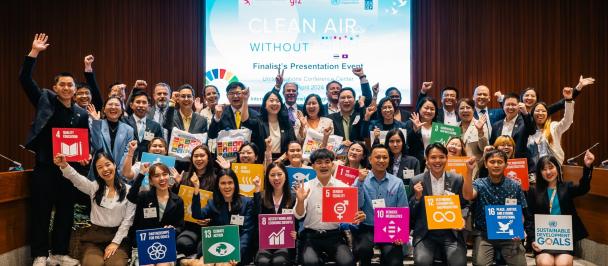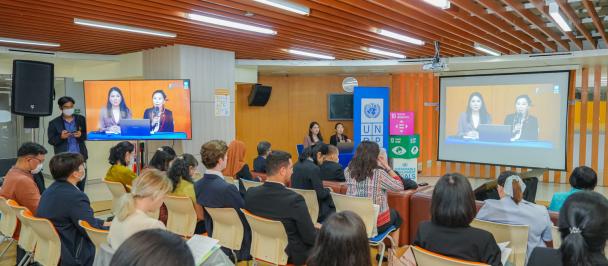Calling All Educators in Thailand to Become the Climate Box Educator
July 3, 2025

1. Overview
1.1 Goals and Objectives
The 2ndInternational Contest for Educators for the Development of Methodological Materials on Climate Change based on the educational toolkit "Climate Box" (hereinafter referred to as the Contest) is organized to encourage educators to create innovative educational materials, support their professional growth, and enrich existing educational resources.
Objectives:
- Motivate educators to develop methodological materials adapted for different age groups.
- Expand the content of the "Climate Box" with new thematic and methodological developments.
- Implement modern educational formats (gamification, digital tools, interdisciplinary approaches) to increase student engagement.
- Create conditions for the professional development of educators through expert evaluation, feedback, and publication of the best works.
- Form a database of relevant educational resources integrated into the school curriculum.
Educators are encouraged to develop methodological materials using the "Climate Box" toolkit, developed by UNDP and its partners. Access to materials of Climate Box: https://climate-box.com.
Contest languages: English or national languages
Organizer: UNDP, with the support of Ministries of Education, educational institutions, and public organizations of the participating countries.
Participating Countries: Lao PDR, Thailand, Viet Nam,
Participants: Teachers and other educators engaged in climate change education, preferably using the printed or electronic version of the "Climate Box Toolkit" as a resource.
2. Submission Procedure and Nominations
2.1 Procedure and Deadlines
To participate in the Contest, it is necessary by September 30, 2025:
- Register by filling out the electronic application form at the following link: https://forms.gle/kP34WyfkC4awtY8MA
- Attach your contest work to the registration form in the appropriate window.
- Up to 5 files are accepted, each no larger than 10 MB.
- For larger files, provide a download link. You can also provide links to your video or media materials on YouTube or any similar online resource.
The results of the contest will be announced by October 15, 2025.
2.2 Contest Nominations
Submissions are accepted in the following categories:
- Integration of Climate Change Topics into School Subjects and Classroom Lessons
- Extracurricular Activities on Climate Change
- Video Lessons and Other Educational Media Materials on Climate Change
- Strategies for Developing Climate-Related Projects for Children and Youth
3. Requirements for Contest Materials and Evaluation Criteria
3.1 Integration of Climate Change Topics into School Subjects and Classroom Lessons
3.1.1 Requirements to task
- The contest entry must include include the development and implementation of a lesson in a school subject that incorporates climate change topics.
- An interdisciplinary lesson integrating Climate Change topics into multiple subjects is also acceptable.
- Participants may submit multiple lesson plans; however, at least one lesson must be conducted and documented.
3.1.2 Formatting Requirements and Structure Lesson Plan
- The lesson plan must be submitted as a separate PDF file for each lesson, with a maximum length of five pages (Times New Roman or Arial, size 12, line spacing 1.15, no more than 2,500 words).
- The lesson plan must include:
- Lesson topic and related climate change theme
- School subject and related themes.
- Target age group (grade levels).
- Lesson objectives and pedagogical tasks.
- Required equipment and materials.
- Lesson structure, including:
- Introduction and classroom management.
- Knowledge activation.
- Main content.
- Reinforcement of learning.
- Lesson conclusion and reflection.
- Additional resources (not included in the page limit but may be attached as supplementary materials):
- Presentations, worksheets,
- Audio and video materials,
- Interactive assignments and other supplementary tools.
Materials from the Conducted Lesson
The results of the conducted lesson must be presented in PowerPoint format (maximum 10 slides).
The presentation must include:
- General Information:
- Date of the lesson.
- Number and age of participants.
- Involved partners (if the lesson included parents, school, or external partners).
- Photos from the lesson.
- Conclusions and recommendations:
- Key results and lesson effectiveness.
- Suggestions for improving the lesson or adapting it for other age groups.
- Additional information (if applicable).
3.1.3 Evaluation Criteria
- Effective integration of Climate Change topics nto school curricula.
- Diversity of methods for engaging students in learning.
- Opportunities for student self-reflection.
- Involvement of internal and external stakeholders and partners.
- Creation of conditions for fostering climate-conscious behavior in children, aimed at reducing CO₂ emissions and implementing adaptation measures.
3.2 Extracurricular Activity on Climate Change
3.2.1 Requirements to task
- The contest materials must include the development and implementation of an extracurricular activity on climate change.
- Participants may submit multiple activity plans, but at least one activity must be conducted and documented.
3.2.2 Formatting Requirements and Structure Activity Plan
- The activity plan must be submitted as a single PDF file with a length of up to 7 pages (no more than 3,500 words).
- The plan must include:
- Activity title.
- Corresponding topic of Climate Change.
- Age group and number of participants.
- Location of the activity (school, external venue, etc.).
- Duration of the activity.
- Objectives and goals of the activity.
- Required equipment and materials.
- Activity script, including:
- Introduction and organizational moment.
- Main part of the activity.
- Conclusion and summary.
- Participant reflection.
Materials from the Conducted Activity
- The results of the conducted activity must be presented in PowerPoint format (maximum 10 slides).
- The presentation must include:
- General Information:
- Date of the activity.
- Number and age of participants.
- Invited guests and partners.
- Photos from the activity.
- Conclusions and recommendations, including key results and activity effectiveness, as well as suggestions for improvement or adaptation for other age groups.
- Additional information (if applicable).
- General Information:
3.2.3 Evaluation Criteria
- Relevance – Alignment of the activity with the topic of climate change.
- Innovative approaches – Original methods for engaging students and the community in climate action.
- Collaboration – Implementation of joint initiatives involving interested organizations and partners.
- Scalability – Potential for replicating the activity in other educational institutions and regions.
- Impact assessment – The ability to measure the activity’s positive effect on students’ understanding and adoption of climate-conscious behavior.
3.3 Video Lessons and Educational Media Materials on Climate Change
3.3.1. Requirements
- Submissions should include a short educational video or media material (e.g. animated clips, explainer videos, or student-made media) focused on climate change themes.
- Videos may cover climate science, adaptation, mitigation, climate-friendly habits, or inspiring action.
- Videos can be independently created by educators or co-created with students.
3.3.2. Formatting Requirements and Structure
- Videos should be submitted in MP4 or another widely supported format.
- Length: 1–5 minutes.
- Include a brief written description (PDF, max. 2 pages) that covers:
- Video title and theme
- Target audience
- Educational objectives
- Summary of the content and creative approach
- Roles of students and educators in creating the video (if applicable)
3.3.3. Evaluation Criteria
- Clarity and accuracy of climate change content
- Creativity and engagement of the visual/educational format
- Relevance to the target age group
- Potential for use in educational settings
- Student involvement (if applicable)
3.4 Strategy for Developing Children's and Youth Climate Projects
3.4.1 Requirements to task
- This category is intended for educator-mentors (project supervisors) guiding students in climate-related project development , preferably using materials from the "Climate Box."
- Participants must present a methodology for their strategy in working with children and youth, aimed at preparing and implementing climate initiatives at various levels, based on their own experience.
- The contest entry must include:
- Description of the strategy for preparing and implementing climate projects.
- Evidence of effectiveness, including examples of successful projects, data, and analysis.
3.4.2 Formatting Requirements and Structure
Submission Format:
- The contest entry must be submitted in PDF format.
- The document length should be up to 7 pages (no more than 3,500 words).
- Additional materials (presentations, project examples) may be attached separately.
The contest materrals must include:
- Objective and Goals – A clear description of the strategy’s purpose and objectives, as well as its relevance in the context of climate education and student project activities.
- Structure and Sequence – A logical explanation of the project preparation process, including stages of working with children, such as planning, research, data analysis, and presentation of results.
- Methods and Tools – Use of effective pedagogical methods for guiding students through project development.
- Practical Application – Adaptability of the strategy for different age groups and feasibility in various educational settings (in-person, remote learning, extracurricular activities).
- Effectiveness – Expected outcomes for students, including project management skills, critical thinking, and understanding of climate issues—with examples of successful projects.
- Evidence Base – Supporting materials, including project examples, research findings, and relevant literature references.
3.4.3 Evaluation Criteria
- Innovation and Creativity – Novel approaches, original solutions, and use of digital tools.
- Adaptability and Realism – The strategy’s potential for replication in different schools, cities, and countries while considering the actual capabilities of educators and institutions.
- Student Engagement in Project Activities – Development of independent thinking, research skills, and critical analysis.
- Fostering Climate Responsibility – Encouraging students to take real climate actions, such as implementing projects, volunteering, and adopting climate-friendly habits.
- Individual Approach – Consideration of students' different skill levels, interests, and abilities within the methodology.
4. Evaluation and Awards
Contest entries will be evaluated by an international expert jury based on the criteria outlined in this document for each category.
- Winning entries will be published on the "Climate Box" website (https://climate-box.com) with full author attribution.
- Winners will receive international certificates from UNDP.
- Selected works may receive technical support, including design improvements and other enhancements.
- The three best entries across all categories will be invited to an in-person international educators' conference in autumn 2025 as part of the "Climate Box" program, where the authors will present their materials.
5. Use of Contest Materials Winthin the "Climate Box" Programme
- The "Climate Box" program reserves the right to use and modify submitted materials while ensuring proper author attribution.
- The materials may be used for educational and awareness-raising purposes to increase climate change awareness.
- By submitting their materials, authors agree to their potential use within the program’s activities.
For more information and queries, please contact: undpclimateboxthailand@gmail.com

 Locations
Locations



